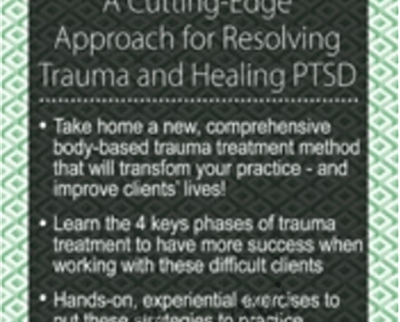Trauma Therapy: A Cutting-Edge Approach for Resolving Trauma and Healing PTSD – Saj Razvi
Trauma Therapy: A Cutting-Edge Approach for Resolving Trauma and Healing PTSD – Saj Razvi Download. Leave the seminar with a much more coherent understandi…

Original price was: $199.99.$55.00Current price is: $55.00.
Contents
Salepage link: At HERE. Archive:
- Take home a new, comprehensive body-based trauma treatment method that will transform your practice – and improve clients’ lives!
- Learn the 4 key phases of trauma treatment to have more success when working with these difficult clients
- Hands-on, experiential exercises to put these strategies to practice
Watch this workshop and take away new treatment techniques that bring together research and interventions from the fields of memory research, Peter Levine’s modeling of the autonomic nervous system, and Bessel Van der Kolk’s research on the biology of trauma. Valuable elements from other approaches such as DBT, attachment theory and psychodynamic transference work will also be discussed.
Saj Razvi, trauma expert and founder of the Love and Trauma Center in Colorado, will teach skills that shift your client’s nervous system state from activated to calm, and be able to track your clients using their body responses and symptoms. Through hands-on experience learn how clients can move beyond the avoidance and management of symptoms into actually resolving trauma through a body process innate to the nervous system.
Learn through experimental labs:
- The process of resourcing so that you will know how to support clients in coping with and managing traumatic symptoms, before trauma resolution begins
- Containment: the process of releasing traumatic charge through the body
Join Saj Razvi for this dynamic workshop, and learn practical, cutting-edge skill sets. Leave the seminar with a much more coherent understanding of the trauma process, as well as specific skill sets to work with a client’s traumatic reactivity.
- Analyze the various memory systems and know which interventions are appropriate to each memory system.
- Describe how the nervous system can be used in trauma resolution.
- Recognize and track clients for the 5 major autonomic nervous system stress and trauma states.
- List the 4 key phases of working with traumatized clients and how to clinically work within each phase.
- Summarize the dangers, value and need of working traumatic transference that is part of complex, relational PTSD.
- Identify the initial conditions required for trauma resolution to occur.
- Explain the functional difference between sympathetic activation and parasympathetic responses to threats.
The Latest Research on Trauma
- The impact of trauma on mental illness
- The impact of trauma on physical illness
- Outcomes of unresolved trauma
How and Where Trauma is Stored
- How to navigate the three memory systems
- Semantic (narrative) memory
- Event (autonomic) memory
- Procedural (behavioral) memory
- Strategies for matching specific interventions to memory systems
The Autonomic Nervous System
- 5 discrete autonomic nervous system states used to respond to trauma
- Mild stress to full dissociation
- Bottom-up processing
4 Essential Phases of Trauma Therapy
- Resourcing
- (Re)establishment of boundaries, trust and attachment
- Containment through the autonomic nervous system
- Integration
Trauma Therapy and Other Mental Health Disorders
- Addiction recovery
- ?How trauma can complicate recovery
- Integrating recovery and trauma therapy
- ?Differential Diagosis
- Bipolar disorder
- Depressive disorders
- Anxiety-based disorders
Strategies for Traumatic Transference
- Working with transference is essential for processing trauma
- When and how to move away from and toward transference
- The 4 transferential “roles”: victim, perpetrator, bystander and savior
Experiential Lab I – Somatic Containment of Stress and Trauma
- Transform the theory into practice
- Traumatic change heals by sequencing through the body
- Mindfulness to track somatic process
- Viscerally feeling the 5 different nervous system states
- Empathy for where you’re leading clients
- An entirely new understanding of how to heal PTSD
Experiential Lab II- The Foundation of Resourcing
- Resourcing as the first phase of most trauma, exposure therapies
- The skill of autonomic regulation
- Self-soothing techniques to develop new habitual coping responses
- Trauma management vs. over-resolution
- Guide clients out of trauma and stress into their own refuge
Review by NLP
Review by NLP
Reviews (0)
User Reviews
Only logged in customers who have purchased this product may leave a review.









There are no reviews yet.